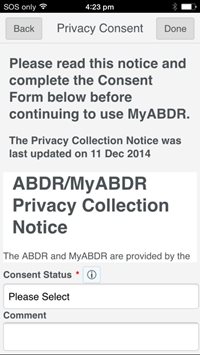SUZANNE O'CALLAGHAN AND PETER O'HALLORAN
Suzanne O'Callaghan is Policy Research and Education Manager, Haemophilia Foundation Australia
Peter O’Halloran is Executive Director and Chief Information Officer at the National Blood Authority
 WHAT’S NEW?
WHAT’S NEW?From 26 January 2015 patients at Haemophilia Treatment Centres (HTCs) are being asked to complete a new ABDR (Australian Bleeding Disorders Registry) privacy consent form.
If you use MyABDR, you will have been asked to complete the new ABDR privacy consent form when you logged in on or after 26 January 2015. You need to complete the consent form before you can continue.
Alternatively, your HTC may ask you to complete a printed consent form.
This is a progressive transition process for the ABDR. This means that HTCs will work through their list of patients over time to document their consent for the ABDR. So if you are a patient at an HTC and already have your data in the ABDR, your HTC will still keep collecting your data in the ABDR until you complete the consent form.
The Commonwealth Privacy Act – an Australian law that regulates how your personal information is handled – has been strengthened. As a result, you are now being asked formally if you consent or agree to have your personal information in the ABDR.
You may also be asked to consent on behalf of your child if they are the patient at the HTC and are under 18.
This is called an opt-in system. It will make it clear whether you have agreed to have your personal information in the ABDR. You also have the opportunity to find out more about the ABDR and how your personal information is used and protected
In the past it was an opt-out system – your personal information was kept in the ABDR unless you asked for it not to be entered in the system. You may recall your Haemophilia Treatment Centre talking to you about the ABDR and giving you a pamphlet.
“Our patients’ data in the ABDR has not changed – all that we are doing is confirming their consent to have their personal information included. This is an important process to keep up-to-date with national privacy law. It will mean we will have clear patient consent to collect information to improve individuals’ clinical care and to assist with better planning for improvements in product availability. AHCDO is also working on a parallel process to obtain a broad approval from hospital ethics committees to enable this data to be used for research to improve care,” said Dr John Rowell, Director of the Queensland Haemophilia Centre and ABDR Co-ordinator with the Australian Haemophilia Centre Directors’ Organisation (AHCDO).
The Australian Bleeding Disorders Registry (ABDR) is a computer database of health care information about people with bleeding disorders. The ABDR is the system used by Haemophilia Treatment Centres around Australia for the clinical care of their patients.
Visit the ABDR MyABDR Privacy Consent page
Or collect the Consent to Privacy leaflet from your Haemophilia Centre.
Or ask HFA to send you a Consent to Privacy leaflet – email hfaust@haemophilia.org.au or phone 1800 807 173 toll free.
Contact the MyABDR Support Team
Available 24hrs, 7 days a week
T: 13 000 BLOOD (13 000 25663)
E: myabdr@blood.gov.au
Haemophilia Foundation Australia acknowledges the Traditional Owners and Custodians of Country throughout Australia, the land, waters and community where we walk, live, meet and work. We pay our respects to Elders past and present and extend that respect to all Aboriginal and Torres Strait Islander peoples.
Sign up for the latest news, events and our free National Haemophilia magazine